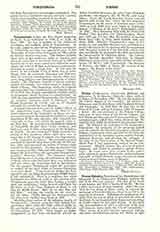

Torquemada, TOMÀS DE, first Grand Inquisitor of Spain, b. at Valladolid in 1420; d. at Avila, September 16, 1498. He was a nephew of the celebrated theologian and cardinal, Juan de Torquemada. In his early youth he entered the Dominican monastery at Valladolid, and later was appointed prior of the Monastery of Santa Cruz at Segovia, an office which he held for twenty-two years. The Infanta Isabella chose him as her confessor while at Segovia, and when she succeeded to the throne of Castile in 1474 he became one of her most trusted and influential councillors, but refused all high ecclesiastical preferments, choosing to remain a simple friar. At that time the purity of the Catholic Faith in Spain was in great danger from the numerous Marranos and Moriscos, who, for material considerations, became sham converts from Judaism and Mohammedanism to Christianity. The Marranos committed serious outrages against Christianity and endeavored to judaize the whole of Spain. The Inquisition, which the Catholic sovereigns had been empowered to establish by Sixtus IV in 1478, had, despite unjustifiable cruelties, failed of its purpose, chiefly for want of centralization. In 1483 the pope appointed Torquemada, who had been an assistant inquisitor since February 11, 1482, Grand Inquisitor of Castile, and on October 17 extended his jurisdiction over Aragon.
As papal representative and the highest official of the inquisitorial court, Torquemada directed the entire business of the Inquisition in Spain, was empowered to delegate his inquisitorial faculties to other inquisitors of his own choosing, who remained accountable to him, and settled the appeals made to the Holy See. He immediately established tribunals at Valladolid, Seville, Jaen, Avila, Cordova, and Villa-real, and, in 1484, at Saragossa for the Kingdom of Aragon. He also instituted a High Council, consisting of five members, whose chief duty was to assist him in the hearing of appeals (see Inquisition. —The Inquisition in Spain). He convened a general assembly of Spanish inquisitors at Seville, November 29, 1484, and presented an outline of twenty-eight articles for their guidance. To these he added several new statutes in 1485, 1488, and 1498 (Reuss, “Sammlungen der Instructionen des spanischen Inquisitionsgerichts”, Hanover, 1788). The Marranos found a powerful means of evading the tribunals in the Jews of Spain, whose riches had made them very influential and over whom the Inquisition had no jurisdiction. On this account Torquemada urged the sovereigns to compel all the Jews either to become Christians or to leave Spain. To frustrate his designs the Jews agreed to pay the Spanish government 30,000 ducats if left unmolested. There is a tradition that when Ferdinand was about to yield to the enticing offer, Torquemada appeared before him, bearing a crucifix aloft, and exclaiming: “Judas Iscariot sold Christ for 30 pieces of silver; Your Highness is about to sell him for 30,000 ducats. Here He is; take Him and sell Him.” Leaving the crucifix on the table he left the room. Chiefly through his instrumentality the Jews were expelled from Spain in 1492.
Much has been written of the inhuman cruelty of Torquemada. Llorente computes that during Torquemada’s office (1483-98) 8800 suffered death by fire and 96,504 were punished in other ways (Histoire de l’Inquisition, IV, 252). These figures are highly exaggerated, as had been conclusively proved by Hefele (Cardinal Ximenes, ch. xviii), Gams (Kirchengeschichte von Spanien, III, II, 68-76), and many others. Even the Jewish historian Graetz contents himself with stating that “under the first Inquisitor Torquemada, in the course of fourteen years (1485-1498) at least 2000 Jews were burnt as impenitent sinners” (“History of the Jews”, Philadelphia, 1897, IV, 356). Most historians hold with the Protestant Peschel (Das Zeitalter der Entdeckungen, Stuttgart, 1877, pp. 119 sq.) that the number of persons burnt from 1481 to 1504, when Isabella died, was about 2000. Whether Torquemada’s ways of ferreting out and punishing heretics were justifiable is a matter that has to be decided not only by comparison with the penal standard of the fifteenth century, but also, and chiefly, by an inquiry into their necessity for the preservation of Christian Spain. The contemporary Spanish chronicler, Sebastian de Olmedo (Chronicon magistrorum generalium Ordinis Praedicatorum, fol. 80-81), calls Torquemada “the hammer of heretics, the light of Spain, the savior of his country, the honor of his order”.
MICHAEL OTT


